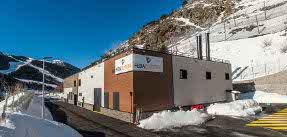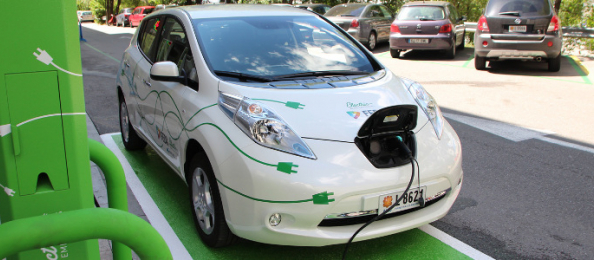Photo: FEDA
Andorra’s Challenges: A more Open and more Competitive Country
For 2017, Andorra has set itself the objective of consolidating the country’s efforts to open up beyond its borders, renew the Andorran educational system, and improve its communication infrastructure with the construction of a national heliport.
However, one major challenge that stands out within the environmental arena is the commitment to energy diversification and sustainability. The major global challenges in this matter are also of concern to Andorra. Problems such as climatic change and global warming can have a direct impact in a country where the economy is very closely linked to snow and mountain tourism.
In 2015, Andorra was one of the first countries to present its national contribution to the agreement to fight climatic change (COP21). In 2016 it was present at the signing of the New York Agreement, which envisages a 37 percent reduction in emissions up to 2030, and emissions neutrality by 2050. In Andorra, the main sources of gas emissions with a greenhouse effect are transport and heating.
Andorra ranks second in the world for the number of electric cars
In transport matters, the country has a program in place to encourage the use of electric vehicles, with public monies covering up to 50 percent of the vehicle cost. The Principality now ranks second in the world for the number of electric cars, and in 2016 electric vehicles accounted for 6 percent of registrations. Andorra has achieved this feat in just a month and a half, when the initial target was to reach this level over a period of three years. This shows that citizens believe in this new mode of mobility.
FEDA will play a very important role in this change of mobility model by deploying a network of charging stations throughout the country. The network currently has eight charging points, each with two charging points, and it covers all of the country’s parishes. These charging points will provide extra support for domestic systems, and this deployment will continue in 2017.
FEDA promotes the use of electric vehicles, subsidizing the first two hours at charging points on public roads as well as 50 percent of the rental cost of domestic charges. Together with the Automobile Club of Andorra, it also organizes “Electric Mobility Days,” during which the public can try out various electric mobility solutions: vehicles, motorcycles, scooters, bicycles, and Segways.
In other mobility-related matters, FEDA wants to be a pioneer in the introduction of hydrogen-battery-powered vehicles in the Principality and in the production of local hydrogen through water electrolysis using photovoltaic solar energy. To make this implementation possible, a trans- Pyrenean project team has been created with the participation of Andorra, Catalonia, Aragon, and France. A hydrogen corridor will be created, and this will help to increase the network of European corridors using this technology. This corridor is formed by the three Pyrenean states, and specifically by the zones of Rodez, Albi, Pamiers, Andorra, Fraga, Tarragona, Huesca, and Zaragoza. These regions will have several hydrogen recharging stations with different technologies and 16 hydrogen-battery-powered vehicles to demonstrate their viability.
2016 – the year that the country’s first cogeneration plant commenced operations
Within the second area, heating, FEDA brought Andorra’s first cogeneration plant and heat network into operation under the FEDAECOTERM brand. In addition to producing electricity, the new infrastructure also supplies urban heating to major consumers in the town of Soldeu, and 70 percent of potential customers have been connected to the heat network since it started operating in December 2016. The fuel used to produce hot water and electricity is liquefied natural gas. This is the fossil fuel with the lowest environmental impact.
The plant represents the first cornerstone of the new national energy policy, which is aimed at increasing domestic production and moving toward a more sustainable energy model that is less dependent on external suppliers. Accordingly, the objective of producing 30 percent of the energy that we consume, which was already established in Andorra’s White Paper on Energy, is now a little closer, thanks to this new plant. It will be able to increase the electricity produced in Andorra by more than 10 percent, which is the equivalent of approximately 2 percent of overall electricity consumption.
Another similar project will soon see the light in the years to come. This is the Waste Treatment Plant of Andorra, situated in the capital, Andorra la Vella. The main aim of the project is to take advantage of the residual heat from the waste treatment plant by increasing its efficiency, currently 60 percent, to more than 80 percent, in order to heat water and distribute it through an urban heat network that will pass through a large area of the capital. This project will help to improve the value of waste treatment, and it will lead to a reduction in CO2 emissions, thanks to the fact that gasoil heating will be substituted by the residual heat generated at the center.
FEDA is leading a very ambitious 10- year investment plan with the aim of encouraging domestic production and promoting renewable energies as well as making Andorra a more sustainable and competitive country through attractive energy costs.
Relevant Data 2016:
Population of Andorra:
73,105 inhabitants
Electrical energy demand:
583.5 GWh
Electrical energy production:
98.5 GWh (17% of demand)
Electrical network of
705 km (83% underground)
33,559 FEDA customers
SAIDI:
4.92 min

Forces Elèctriques d’Andorra (FEDA) is a semi-public entity created by law the 14th of January of 1988, modified the 18th of January of 1991 and the 4th of November of 1993. The Andorran Government owns the totality of its capital.
FEDA is in charge of producing electric energy, taking advantage of the country’s own resources, importing the electric energy necessary and distributing said energy.
FEDA has consolidated as a company, grown along with the country’s economic rhythm and improved the quality of electric service year after year.
At present, FEDA has met the challenge of modernizing all of its installations while at the same time tripling the energy available for consumption in Andorra.
FEDA’s mission:
- Offer an essential energy supply service to our clients and propel energy development within the country by investing the necessary resources and improving quality and security in a sustainable fashion.
FEDA’s values:
- Client service.
- Quality orientation.
- Spirit of Improvement.
- Cooperation.
- Commitment to people.
Source: FEDA
About Us // Privacy Policy // Copyright Information // Legal Disclaimer // Contact
Copyright © 2012-2018 macondo publishing GmbH. All rights reserved.
The CSR Academy is an independent learning platform of the macondo publishing group.









